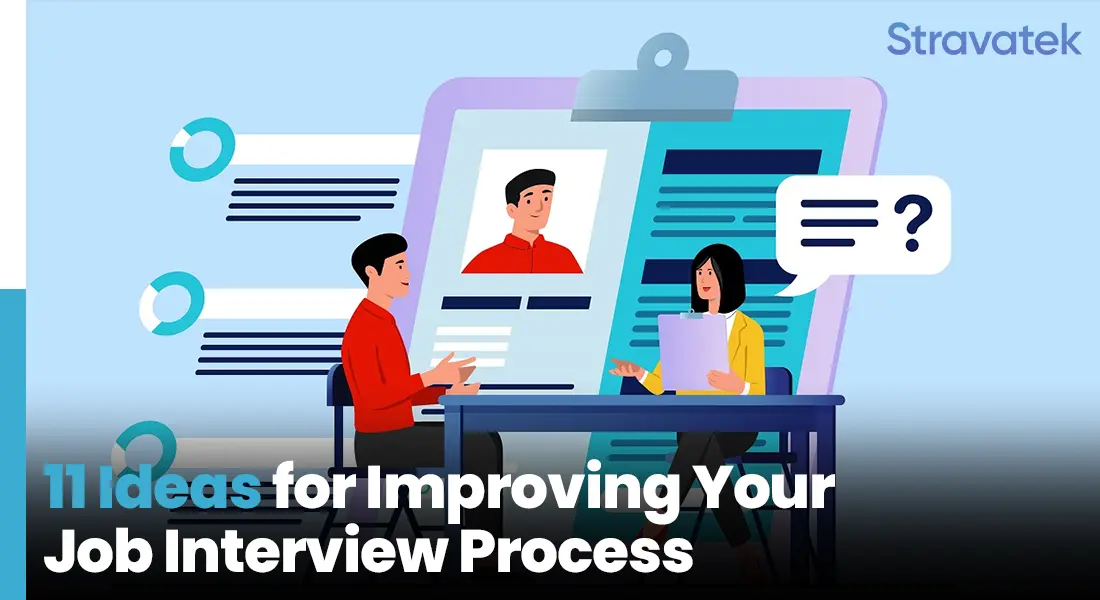11 Ideas for Improving Your Job Interview Process

In the current competitive job market, the effectiveness of the job interview process is paramount in selecting the ideal candidates. With recruiters spending, on average, two-thirds of their hiring time on interviews, it’s clear that this stage is not only the most time-consuming but also the most labor-intensive aspect of hiring. Despite its importance, many interviewers encounter challenges that can diminish the effectiveness of their interviews. This article explores practical strategies to refine the job interview process, emphasizing developing a more structured, objective, and equitable approach tailored to meet the intricate demands of modern hiring practices. Visit: HR Expert.

1. Structured Interviews
Structured interviews are pivotal in achieving consistency and fairness. Start by comprehensively understanding the job’s requirements. Then, develop a set of standardized questions directly related to these requirements. Each interview candidate should be asked these same questions. This approach minimizes the influence of the interviewer’s personal biases and focuses on the candidate’s actual qualifications and fit for the job.
2. Non-Verbal Cues
Non-verbal cues like body language and appearance can subconsciously influence an interviewer’s decision. To counter this, set clear, reasonable standards for non-verbal cues that are appropriate to your company’s culture. Once these baseline standards are met, the interviewer should then shift focus to the candidate’s verbal responses, ensuring that decisions are based on substance rather than presentation.
3. Consistency Among Interviewers
Differences in interviewing styles can lead to inconsistency in candidate evaluation. Train interviewers to focus on extracting and assessing factual information from interviews. Encourage them to use specific examples from the candidate’s responses as the basis for their evaluations rather than relying on personal impressions or gut feelings. This will ensure a more balanced and fair assessment process.
4. Performance-Based Evaluation
Candidates often present themselves in the best light, making promises or emphasizing past achievements. Shift the focus to their actual performance and capabilities. Ask questions that probe into specific results they have achieved and how they achieved them. Consider including practical assessments or work samples to gauge their true abilities more accurately.
5. Informative Interviews
A job interview process is also an opportunity for candidates to learn about your company. Provide them with comprehensive information about the role and the company, and ensure there are opportunities for them to ask questions. This exchange of information helps candidates make an informed decision about their fit with the company, just as you assess their fit for the role.
6. Interview Guides
An interview guide is a tool that ensures all candidates have a consistent interview experience. Tailor the guide to include questions and topics relevant to the specific role and your organizational needs. Include “how long is an interview” section in the guide to let the interviewer know the duration each interview should last for. Besides that, mention what type of questions should be asked at the different stages of interview. A well-structured guide helps reduce biases and ensure a fair assessment of each interview candidate.
7. Reduce Chit-Chat in Interviews
Minimizing small talk in interviews is crucial for maintaining objectivity and fairness. While casual conversation at the beginning of an interview can help put candidates at ease. It is essential to keep this brief and not let it steer the interview off course.
Excessive chit-chat can inadvertently lead to biases, as interviewers might form opinions based on personal details unrelated to the candidate’s professional qualifications. For instance, discussing topics like hometowns, hobbies, or even weather conditions can subtly influence the interviewer’s perceptions, leading to biases such as affinity bias, where the interviewer favors candidates they personally relate to.
8. Real-Time Note Taking
Documenting impressions and responses during the job interview process is crucial for accurate assessment. This method helps in capturing immediate reactions and thoughts, reducing the influence of biases that can occur when relying on memory. Use a structured format for note-taking to ensure all relevant aspects are consistently evaluated for each interview candidate.
9. Rubric-Based Grading
Before conducting interviews, it’s crucial to establish a detailed rubric that clearly outlines the essential skills, qualifications, and competencies required for the role. This rubric should include specific criteria and benchmarks for evaluating a candidate’s profile, such as technical skills, communication abilities, problem-solving capabilities, and cultural fit. For instance, you could rate candidates on a scale for each criterion, with defined parameters for what constitutes a low, medium, or high score.
10. Anonymous Work Assignments
Anonymous work assignments are an effective way to reduce bias in the selection process further. These assignments or tests should be directly related to the job’s requirements, and designed to evaluate the candidate’s skills and problem-solving abilities in a practical context. For instance, this could involve coding tasks for a software engineering role, data analysis for a research position, or a mock project plan for a management role.
11. Diverse Interview Panels
Incorporating multiple interviewers in the hiring process is essential for a well-rounded candidate assessment. Diverse interview panels bring varied expertise and perspectives, significantly reducing individual biases and enhancing the evaluation’s quality. According to MRI Network, 51% of recruiters, find the best candidate after three interviews. Its highlighting the importance of a balanced number of interactions.
Typically, two to four interviews are recommended, balancing thoroughness with efficiency. This range allows an initial screening, more profound skill assessments, and a concluding evaluation or negotiation session. Such a structured approach ensures each candidate is fairly assessed on their merits, increasing the chances of making the right hiring decision.
Conclusion
Improving the job interview process is essential for selecting suitable candidates. By implementing structured interviews, setting clear standards, focusing on performance, providing comprehensive information, and ensuring a fair and unbiased assessment, organizations can enhance the effectiveness of their hiring process. This leads to better hiring decisions, ultimately contributing to the success and diversity of the workforce. Visit: Best IT Companies in Dubai.
If you’re seeking top-tier talent and need expert assistance refining your hiring strategies, Stravatek offers comprehensive HR outsourcing and headhunting services. Our expertise in connecting businesses with exceptional professionals can help you quickly navigate today’s competitive landscape. For a more structured, objective, and equitable hiring approach, visit our website or contact us at HR Services to learn more about how we can drive your organization’s success.
© 2021 Stravatek. All rights reserved.


